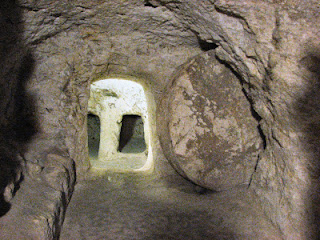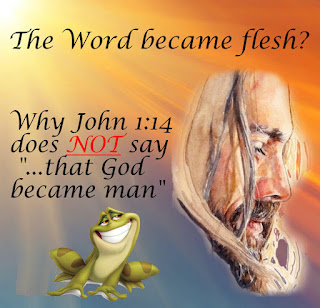Are Trinitarians Idol Worshippers? Are Trinitarians “Saved”?
Listen on One God Report Podcast here.
It’s a
good question. I don’t know if there is a black and white answer because there
are different degrees and facets to the question. Many trinitarians that I know
seem to not really know what they believe, and functionally or “practically”
believe in One God, the Father.
There
are different levels and degrees of judgment. Like James said, teachers will be
judged with greater strictness (James 3:1).
I am
not confident that “everything is going to be alright” for someone who insists
that God is a triune being, a Trinity, or that “Jesus is God”. Trinitarianism
is messing with what Jesus called the greatest commandment: that Yehovah our
God is one (Deu. 6:4, Mark 12:29-34).
Exodus
20:2-3 "I am the LORD your God,
who brought you out of the land of Egypt, out of the house of bondage. 3 "You shall have no other gods before
me.
So the
question is: who, or what (according to Trinitarianism), is the one God. Is the
one God the Father alone, or is the one God a tri-personal being, a substance,
or a group, or a family, that has more
than one person. These can’t both be the one God. The one God is either the
Father alone, or the one God is the Trinity.
And the New Testament says that the One God is the Father:
John
17:1-3 “Father, this is eternal life, to know you, the only true God, and Jesus
Christ whom you have sent.”
1
Corinthians 8:6, “As for us there is one God, the Father...”
_ _ _ _
_
Next, Trinitarianism
is a form of anti-Christ since it denies that Jesus Christ is a human person. To
Trinitarianism, Jesus of Nazareth was never a human person, only a “human nature,
flesh” that the divine person “took on”.
All “deity of Christ” interpretations of passages like John 1 and Philippians
2 attempt to do two things:
1. denigrate the Father by declaring that someone or something else other than
the Father is the one true God, and
2. rob the man Christ Jesus of who he is and what
he did. Since Trinitarianism insists that Jesus is a god-person who only “took
on” human flesh or human nature, that means there never was or is a real human
person Jesus the Messiah from Nazareth. Otherwise, Jesus would be two persons:
a god-person Jesus and a man-person Jesus from Nazareth. But traditional Christianity
decided in AD 451, almost 1600 years ago, that Jesus is not two persons. He is
only the god person. The man Jesus of Nazareth never did anything -never
humbled himself, never obeyed God, never trusted God - because he never
existed. “He was only a god-person all along.”
1 John
2:22-23 Who is the liar but he who denies that Jesus is the Christ? This is the
antichrist, he who denies the Father and the Son. No
one who denies the Son has the Father. Whoever confesses the Son has the Father
also.
Who is
denying the Son? Someone who believes that Jesus is the Messiah, the Son of God
-- or someone who denies that the Jesus, a real human person, is the Christ.
1 John
2:22 does not say, “Who is the liar but he who denies that Jesus is God”. Far from it. People like me believe that
Jesus is the Christ, the Son of God, recognizing the biblical presentation of
who Christ is, and who the Son of God is. The Son of God is never literally God
in the Bible. The title Son of God is given to created beings, especially to
Israel, and to Israel’s chief representative, the king of the line of David.
Christ means
anointed. Anointed by God. In the Bible, the Christ is never God, but is
anointed by God. It is a perversion to think and declare that “Christ is literally
God”.
We do
have a judge, the man, the human person, Jesus the Christ from Nazareth. The
Apostle Paul stated that God “will judge the world in righteousness by a man
whom he has appointed and of this He has given assurance to all by raising him
from the dead” (Acts 17:31). One day we will stand before the resurrected,
glorified Messiah of God, the man Jesus Christ (2 Tim. 2:5, Romans 5:15, 2 Cor.
5:10). Have we said in our hearts during our time in this age “a mere man
can’t judge us, we will not have that man rule over us”?
Will the
resurrected, glorified human Jesus say, “Depart from me, I never knew
you” to the person who insists in this age that Jesus is not a man but is some
imaginary pre-human eternal god or god-man?
Ironically,
perhaps some Trinitarians may be saved by what they’ve insisted they aren’t
saved by, i.e., works (Matt. 16:27, 12:36-37; Romans 2:6-7, 2 Cor. 5:10, 1 Cor.
3:12-14, Gal. 6:7-9, James 2:20-26). I have a feeling that one of those works
will be how people treated the children of God who believe that God is the
Father, and that the man Jesus is the Messiah (1 John 5:1, John 8:42, Matt.
25:41-46).
People
like you and I are not the final judge (Romans 2:16). We don’t have all the
information. God has appointed the man Jesus Christ, and given him the
authority to judge (Acts 17:31, John 5:22, 27). But I think people like you and
I can warn others. Is our God the Father? Or is our God the Trinity? Let us
each examine ourselves. A triune God is not the Father and the Father is not a
triune god. Will we appear before God and attempt to explain to Him why we
insisted He is a triune god and why we condemned his children who know that He
is the Father, and that Jesus is His human Messiah (John 17:1-3)?
“So
each of us shall give account of himself to God” (Romans 14:12).
The Word
of God is our authority, not traditions of men.
Hebrews
4:12 For the word of God is living and active, sharper than any two-edged
sword, piercing to the division of soul and spirit, of joints and marrow, and
discerning the thoughts and intentions of the heart.



Comments
The NT simply commands Christians to judge to discern not to condemnation (John 7.24; cp. 1Cor 2.15; 6:1-11.
carlos@thehumanjesus.org
I think we can agree that the Apostle Paul appropriately wrote things like this:
1 Corinthians 6:9-10 "Do you not know that the unrighteous will not inherit the kingdom of God? Do not be deceived; neither the immoral, nor idolaters, nor adulterers, nor sexual perverts, 10 nor thieves, nor the greedy, nor drunkards, nor revilers, nor robbers will inherit the kingdom of God."
It seems to me that the line is drawn when God gives a man light pertaining to something foundational to right faith and practice, and that man then rejects that light.
The new convert and also the immature believer (that is, not yet weaned off milk and on to a healthy diet of meat) is unable to discern (1 John 4:1-2) good teaching from evil teaching (Hebrews 5:14). How can we expect a meat-free man to be able to withstand such teachings as Incarnation and Trinity? Does God refuse to save a man who is zealous to love and serve his Creator through His one Son by whom men are saved, but who has been fed improperly by men? God forbid! For even Paul says that the gentile man can come to saving faith, solely on the basis of responding to truth about God evidenced through the creation itself, and by allowing himself to be convinced of sin through the Godly leading of his conscience, which he then obeys. How much more, then, is a man saved when he by faith comes to God as a humble and contrite sinner, in the name Lord Jesus... with no more knowledge than that?
I think this topic is spot on, because Deuteronomy 13 seems to make clear that with respect to any teaching that follows Moses -and especially with reference to the one like Moses who was to come- no prophet is to be received or followed if his message deviates from the teaching of Moses regarding the name and numerical personage of God.
On the basis of Deuteronomy 13 (as affirmed and applied to the churches by Paul in Galatians 1:6-10 and elsewhere) Biblical unitarians find a foundational a priori unitarian presupposition to which we can point. Everything the apostles wrote must be filtered through the lens of Moses. The Messiah himself would have it no other way, as he clearly evidenced twice in Luke 24.
The church is to discern the clean from the unclean, and to make a right judgment. In Deuteronomy 13, the penalty for preaching 'a god you have not known' is death. In the church, Deuteronomy 13 is applied, thus: we are to anathematize (that is, relationally put to death) anyone who preaches 'another gospel,' by the due process standard of Matthew 18, Titus 3, etc.
Incarnation and Trinity are certainly 'gods you have not known, another gospel' and 'above that which is written' (1 Corinthians 4:6) and is not found in that which was 'once for all delivered to the saints' (Jude 1:3).
I see it nowhere taught that the church is to police privately held beliefs and speculations.
Preaching and teaching, however, are another matter entirely, and I think it is hard to escape the conclusion that while we ought to be gracious and patient with those who entertain private beliefs and speculations about what is necessary for the reception and maintenance of salvation (just as God was with me, for many years), we are to draw the line with respect to the preaching and teaching of that which is contrary to sound doctrine, such as Incarnation and Trinity.
If anyone preaches or teaches that salvation or right belief include Incarnation or Trinity, he is to be anathematized; that is, he is to be put out of the church after full Matthew 18 due process, and, until he repents, he is to be treated as we would treat a tax collector or a pagan (that is, by loving him as a lost man who needs to hear the gospel).
As Paul says, this is to be done for the salvation of his soul on the day of Judgment. In other words: If you love this sort of unrepentant sinner and you care about his eternal destiny, you will not fail to deal with him according to the scriptures.
Very good points. Thanks.